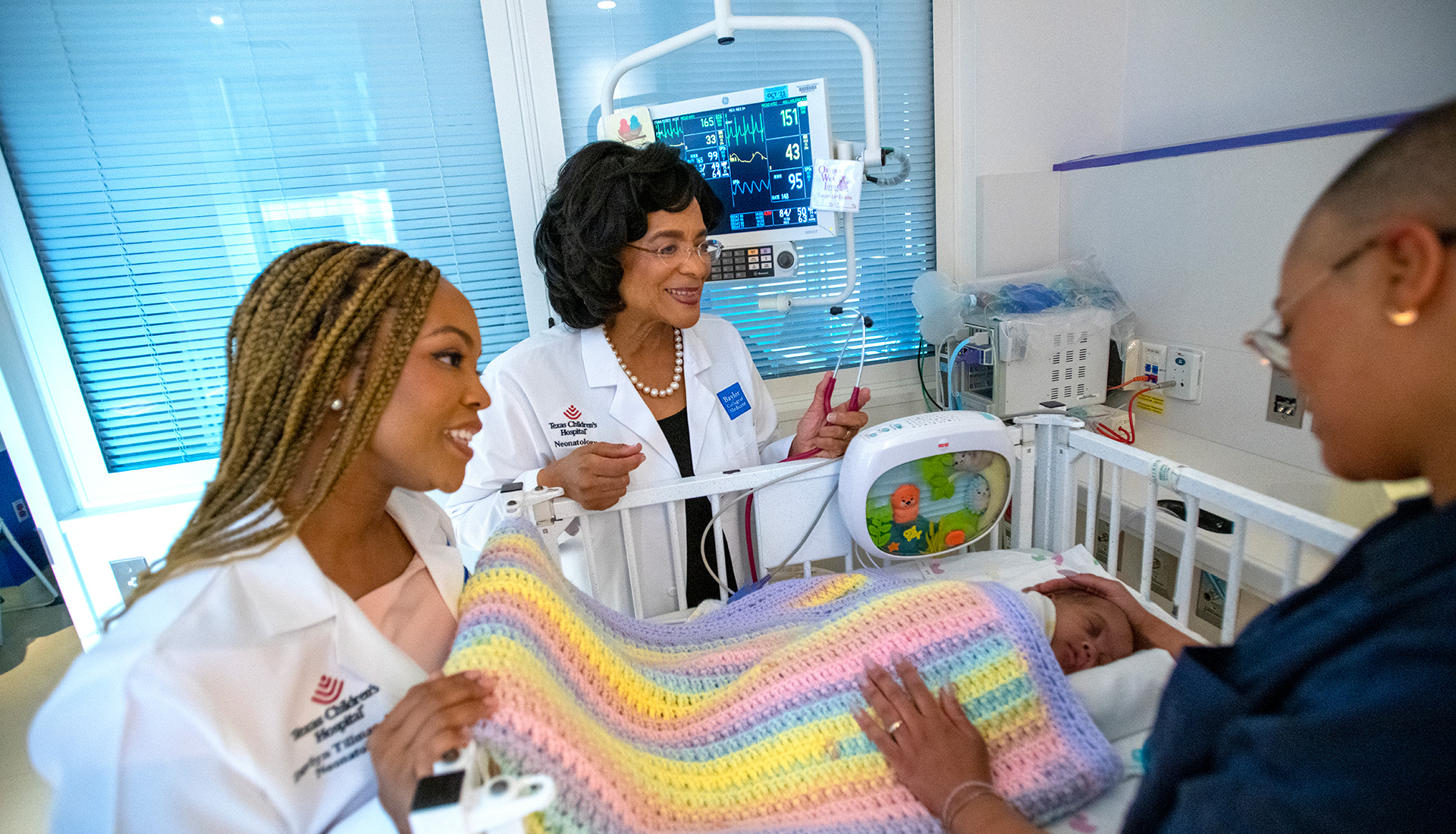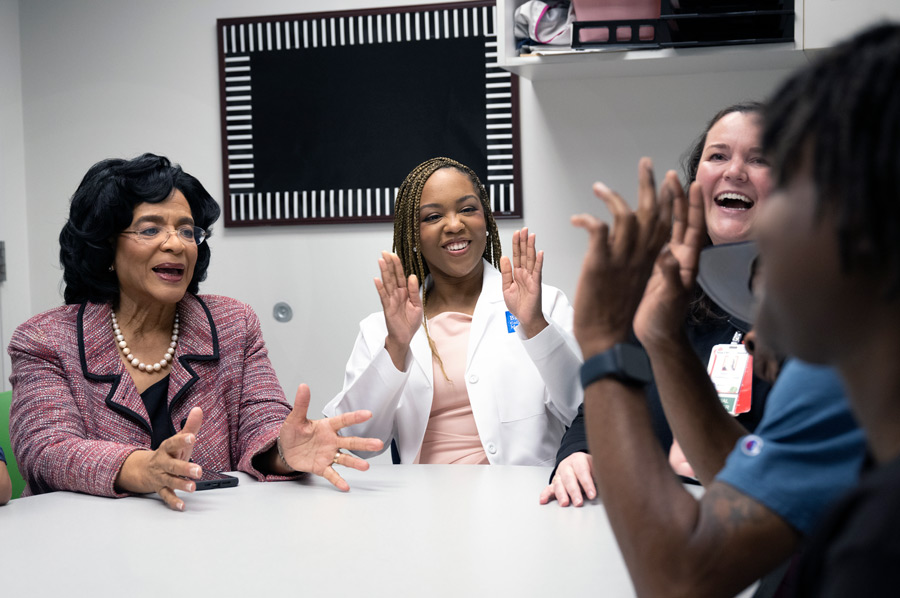

Ranked third in the country for 2023-2024 by U.S. News & World Report, Texas Children’s Hospital Neonatology Section houses one of the largest specialized neonatal intensive care units (NICU) of its kind in the nation. It was the first designated by the Texas Department of State Health Services as a Level IV NICU — the highest level of care available for premature and critically ill newborns.
The first Black female to graduate from Louisiana State University Medical School, Charleta Guillory, MD, MPH, has a host of career accomplishments at the state and career levels:
You can take care of one baby at a time and make a difference in one life at a time. But when you advocate on a state level in Texas, you make a difference in the lives of 400,000 newborns at a time.
For 30 years, Charleta Guillory, MD, MPH, has done both. She was Director of the Texas Children’s Hospital Level II Neonatal Intensive Care Unit (NICU) for over 20 years. She is Professor of Pediatrics-Neonatology at Baylor College of Medicine and Director of the Texas Children’s Neonatal-Perinatal Public Health Program.
In 2021, Dr. Guillory received the Master Clinician Faculty Award for Excellence in Patient Care, the highest institution-wide honor given by Baylor for contributions to the clinical mission of the institution.
She championed landmark legislation on newborn screening and the Children’s Health Insurance Program, which placed Texas at the forefront of infant care in the United States. With 10% of the nation’s 4 million newborns being born in Texas, state policies can impact babies all over the country.
At Texas Children’s, Dr. Guillory now co-chairs the Newborn Center Health Equity Strategic Team, along with Davlyn Tillman, MD, Assistant Professor of Pediatrics-Neonatology at Baylor College of Medicine and Neonatologist at Texas Children’s Hospital. The team is one of five strategic pillars established after the 2021 arrival of Kristina M. Reber, MD, as Division Chief of Neonatology.
From paying parking fees for parents to publishing data gathered from NICU patients and families — the Health Equity Strategic Team seeks to achieve health equity, in which “every person has the opportunity to attain his or her full health potential and no one is disadvantaged from achieving this potential because of social position or other socially determined circumstances.”
To eliminate preventable health disparities, the team aspires to integrate into the fabric of the Newborn Center:
A survey of parents whose babies were in the NICU showed that their greatest need was transportation to be with their babies.
“We want to make sure that our mothers and fathers who have babies in the NICU have access to transportation to visit their infants,” Dr. Guillory said.
The transportation program has provided 700 Lyft rides for parents without cars. For those with cars, the program has helped about 400 families meet the expense of parking near the hospital.
Funding for Lyft and parking comes from the Bad Pants Open, an annual charitable golf tournament featuring golfers wearing funny, quirky or unusual pants. Since 1996, the Bad Pants Open has raised more than $7 million to enhance innovation and excellence in the research, treatment and care of infants at Texas Children’s Newborn Center.

With funding from a Baylor Health Equity Research grant, the team, led by Clinical Postdoctoral Fellow Danielle Gonzales, MD, MPH, supported development of a smartphone app to provide mothers of NICU infants with better access to mental health care. The project was based on several factors:
Called NICU Village, the app enables mothers experiencing postpartum depression or anxiety disorders to access online resources for self-directed care and to make appointments with Texas Children’s psychologists or psychiatrists. It urges anyone who feels suicidal to call, text or chat 988 or visit 988Lifeline.org to reach the 988 Suicide & Crisis Lifeline (formerly the National Suicide Prevention Lifeline).
Preliminary analyses showed that the NICU Village app has been widely used by women from historically marginalized racial and ethnic communities who historically encountered barriers to accessing resources. The wide use indicates that this app will reduce barriers to accessing care and will effectively address disparities in postpartum mood disorders.
Another project that addresses parents’ mental health is a NICU peer-to-peer support group. In cooperation with Texas Children’s social workers, the project offers a weekly support group for caretakers so that they can talk with each other as they navigate the stress and unexpected responsibilities of having a baby in the NICU.
“We’re collecting participation rate data to make sure that this support group reflects the diverse patient population that we serve,” Dr. Tillman said.

Dr. Guillory is a co-author of “Health Care Disparities in High-Risk Neonates,” published recently in Clinics in Perinatology. The following key facts are helping set the stage for projects to address disparities in health care access for children and women:
“I am excited to see that health disparity research is an increasing focus in the academic arena,” Dr. Guillory said.
Another data-gathering project underway, led by Assistant Professor of Pediatrics-Neonatology Alice Obuobi, MD, MBA, is supported by a Baylor College of Medicine Health Equity Research grant.
“This grant will allow us to examine outcome data of our highest risk very low-birth-weight babies (less than 1,500 grams) and determine if being born in our unit versus coming from another hospital affects differences in outcomes in our Newborn Center population. It is important to identify data by race and ethnicity and how those factors relate to mortality and morbidity,” Dr. Guillory said.
Rather than practicing alone, the Texas Children’s Newborn Center partners with outside groups working to improve health outcomes for infants. Faculty members work with the March of Dimes, the Texas Pediatric Society-American Academy of Pediatrics and the Texas Medical Association, among others.
The Newborn Center also participates in the Texas Collaborative for Healthy Mothers and Babies, a state-wide quality improvement collaborative. More than 500 people attended a recent three-day summit, which examined the status of screening for critical congenital heart disease in Texas. They analyzed data in the Texas Birth Defects Registry to identify any effects of social determinants of health or disparities within that screening process.
“Our team’s goal is to have an active presence both academically and also in the community we serve,” Dr. Tillman said.
Dr. Tillman and Dr. Guillory are united in their devotion and commitment to improving the care of vulnerable babies.
“Our Newborn Center Health Equity Strategic Team is outlining a plan to tackle health equity data efforts across our Newborn Center’s quality improvement projects, research and innovative care,” Dr. Guillory said. “Our overall goal is to be a Newborn Center that leads health equity efforts for our patients and their families, locally, statewide, nationally and internationally. We want to be known as a center that provides equitable health care to all infants, regardless of their socioeconomic status, race, ethnicity, geographic origin, or preferred language. We want to be a voice for those who have no voice.”